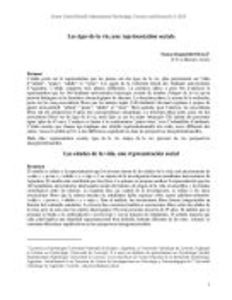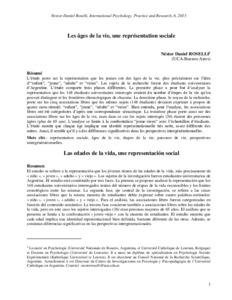Please use this identifier to cite or link to this item:
https://repositorio.uca.edu.ar/handle/123456789/6190| Título: | Les âges de la vie, une représentation sociale Las edades de la vida, une representación social Ages of the life, a social representation |
Autor: | Roselli, Néstor Daniel | Palabras clave: | REPRESENTACION SOCIAL; EDAD; NIÑEZ; JUVENTUD; VEJEZ; VIDA; PSICOLOGIA; ADULTEZ | Fecha de publicación: | 2015 | Editorial: | American Psychological Association | Cita: | Roselli, N.D. Les âges de la vie, une représentation sociale [en línea]. International psichology: practice and research. 2015, 6. Disponible en: https://repositorio.uca.edu.ar/handle/123456789/6190 | Resumen: | Resumen: El estudio se refiere a la representación que los jóvenes tienen de las edades de la vida, más precisamente de « niño », « joven », « adulto » y « viejo ». Los sujetos de la investigación fueron estudiantes universitarios de Argentina. El estudio está constituído por tres fases. La primera se propone analizar la representación que los 148 estudiantes universitarios interrogados tenían del número de etapas de la vida reconocibles y los límites cronológicos entre las mismas. La segunda fase, eje central de la investigación, se refiere a las cinco asociaciones libres que la misma muestra de estudiantes debía expresar sobre cuatro palabras-estímulos: « niño », « joven », « adulto » y « viejo ». Para el análisis, las asociaciones libres fueron categorizadas en función del contenido semántico. La tercera fase concierne también a asociaciones libres sobre las edades de la vida, pero en este caso los sujetos interrogados (36) eran personas mayores de 65 años. El análisis que se presenta se limita a la confrontación « joven-viejo » con la muestra de estudiantes. El estudio muestra que cada edad implica una identidad representacional bien definida, bastante diferente de las otras. Además, se constatan diferencias significativas en las perspectivas intergeneracionales Abstract: The study relates to the representation which the young people have of the ages of the life, more precisely on the idea of “child”, “young person”, “adult” and “old person”. The subjects of research were university students of Argentina. The study consists of three different phases. The purpose of the first phase is to analyze the representation that the 148 questioned university students had amongst stages of the life which one could distinguish and chronological borders of each one. The second phase, the core of research, relates to five free associations that the same subjects (148 students) were to express in connection with four wordstimuli: “child”, “young person”, “adult” and “old person”. Obviously, for the analysis, free associations were categorized according to a semantic correspondence. The third phase also relates to free associations on the ages of the life, but in this case the questioned subjects (36) were elderly people (more than 65 years). The analysis limits to confrontation “young person-old person” with the sample of students. The study shows that each age implies a very clear representational identity, rather different from the others. Also, it seems that there are significant differences from the intergenerational prospects |
URI: | https://repositorio.uca.edu.ar/handle/123456789/6190 | ISSN: | 2157-3883 2157-3891 (online) |
Disciplina: | PSICOLOGIA | Derechos: | Acceso Abierto | Fuente: | International psichology: practice and research. 2015, 6 |
| Appears in Collections: | Artículos |
Files in This Item:
| File | Description | Size | Format | |
|---|---|---|---|---|
| les-ages-vie-representation.jpg | 5,26 kB | JPEG |  View/Open | |
| les-ages-vie-representation.pdf | 994,24 kB | Adobe PDF |  View/Open |
Page view(s)
183
checked on Apr 30, 2024
Download(s)
785
checked on Apr 30, 2024
Google ScholarTM
Check
This item is licensed under a Creative Commons License

